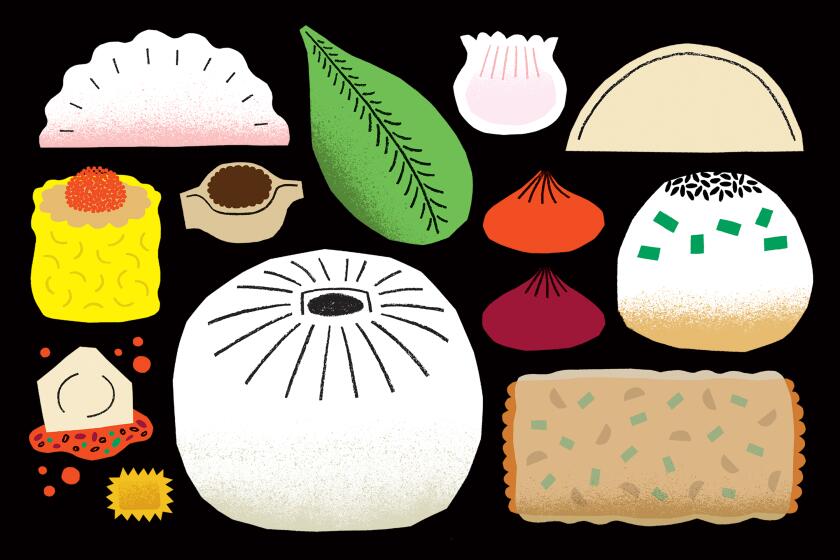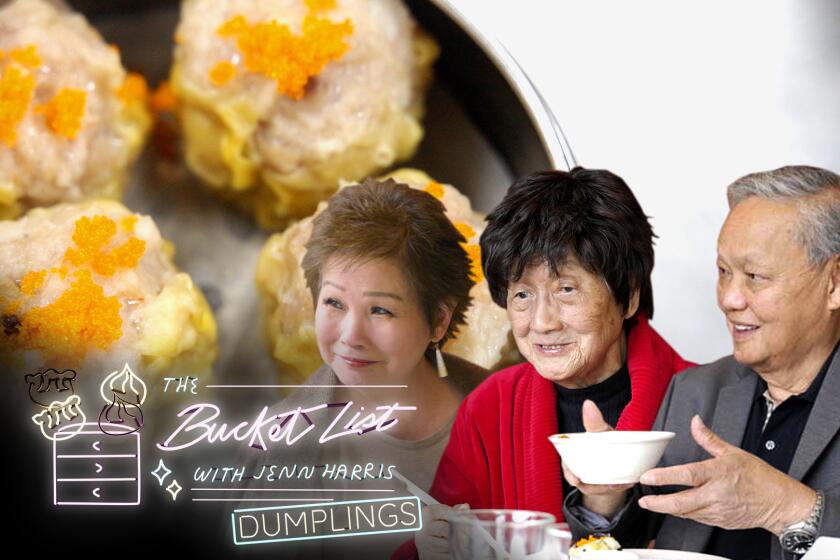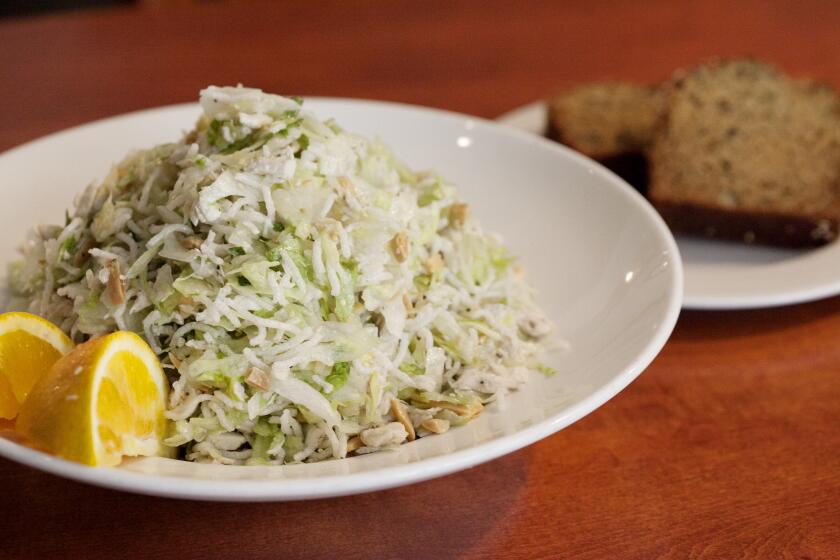Where to find manta, the bite-sized dumplings that are perfect for the holiday season

- Share via
Sarkes Yegiazaryan wants to make manta a household name. The open-style, meat-filled dumplings resemble tiny boats, with a thin layer of dough wrapped around a small meatball in the center. He and his family prepare thousands a day out of their restaurant in Glendale, and they’ve made introducing manta to the public their life’s work.
“I want people to remember manta,” he said. “The name hasn’t stuck yet. My mission is to make it stick.”
On this episode of “The Bucket List: Dumplings,” we’re featuring manta from Sarkes, his mother, Evelina; sister Francine and father, Grant, the family behind the Monta Factory. The Yegiazaryans, who emigrated from western Armenia in the early ‘90s, specialize in one style of manti, a term that encompasses dumplings from all over the world.
Is a calzone a dumpling? What about an empanada? We asked the Dumpling Mafia for Season 2 of “The Bucket List,” which explores dumplings from all over the world right here in Los Angeles.
Manti can be found in the Caucusus, other parts of Russia, Turkey and other areas of the Middle East as well as in South and East Asian countries such as Pakistan and Mongolia. There are different spellings and terms used to refer to manti throughout the regions, including monta, manty, mantu, mante, Turkish ravioli and klepeh. And they can be any size, baked, steamed or boiled depending on where they’re from.
Evelina learned how to make manta from her father’s cousin, who would prepare the dumplings during the holidays when she came to live with the family for a few months in the winter. Sarkes said manta is typically a wintertime dish, made with the help of many hands.
“The house is warm and the manta goes in and it comes out of the hot oven with the hot tomato sauce and you sit there in the cold weather and enjoy it,” he said.
“It’s when families come together and there’s more hands to help with pinching the monta,” Francine added.
On this week’s episode, Jenn visits two dim sum restaurants for shumai, har gow and more dumplings with special guests Lily Rosenthal, Olivia Sui and members of Jenn’s family.
The Yegiazaryans start their day at 5:30 a.m. and prepare the manta dough in a large mixer. They roll out the dough into a paper-thin layer and then spread it over the length of a table in the center of their kitchen. Sarkes makes the filling by adding a “secret spice blend” to the ground beef and mixes it by hand. The dough is cut into small squares and then Evelina, Sarkes, Francine and a small staff get to work filling and folding the dumplings.
“You would get together with the grandparents to make it … it adds more flavor to it,” he said. “The fact that it’s family, it’s not a big company making it, it’s not a machine, it’s my mom, myself, my sister and my dad. It’s keeping the tradition alive.”
The manta are assembled in foil trays and baked until the middle is just cooked and still juicy, the tops are crisp around the edges and the bottoms resemble al dente pasta. I often refer to them as the best bits of a meatball and a potsticker, together as one in an addictive, bite-sized dumpling.
At the Monta Factory, the dumplings are served with ladles of hot tomato sauce and a creamy yogurt garlic sauce. Depending on who you ask, the tomato sauce or the garlic sauce is better or more traditional. Order whatever feels right to you. I always end up getting both.
From gyoza to ravioli to mandu, Jenn Harris explores different dumplings and the stories behind them.
You can now find variations of manti at more than a few restaurants around town, but that wasn’t the case when I first wrote about the Yegiazaryans and their manta in 2016. Back then, they were working out of their first location, a barely 300-square-foot space in Pasadena where the family stood shoulder to shoulder making dumplings from scratch for more than a decade.
“Many families knew about the manta, but they don’t have time to make it,” Evelina said. “So parents would come … mothers were coming and buying for their kids to give them. To fulfill the tradition.”
It started as a small wholesale operation, transitioned to ready-to-serve, and now, the family has a much larger second location in Glendale, with a big kitchen and both indoor and outdoor seating.
“I would love to find a family as crazy as we are, who sit there all day and make manta all day long,” Sarkes said. “I definitely want this to be a household name.”
Stay tuned for more episodes and don’t forget to subscribe to our YouTube channel to never miss a new video.
Restaurants featured in this article
Monta Factory, 1208 W Glenoaks Blvd., Glendale, (818) 396-4445, montafactory.com
Su-Beoreg and Monta Factory, 1531 E Washington Blvd., Pasadena, (626) 398-1525
More to Read
Eat your way across L.A.
Get our weekly Tasting Notes newsletter for reviews, news and more.
You may occasionally receive promotional content from the Los Angeles Times.














